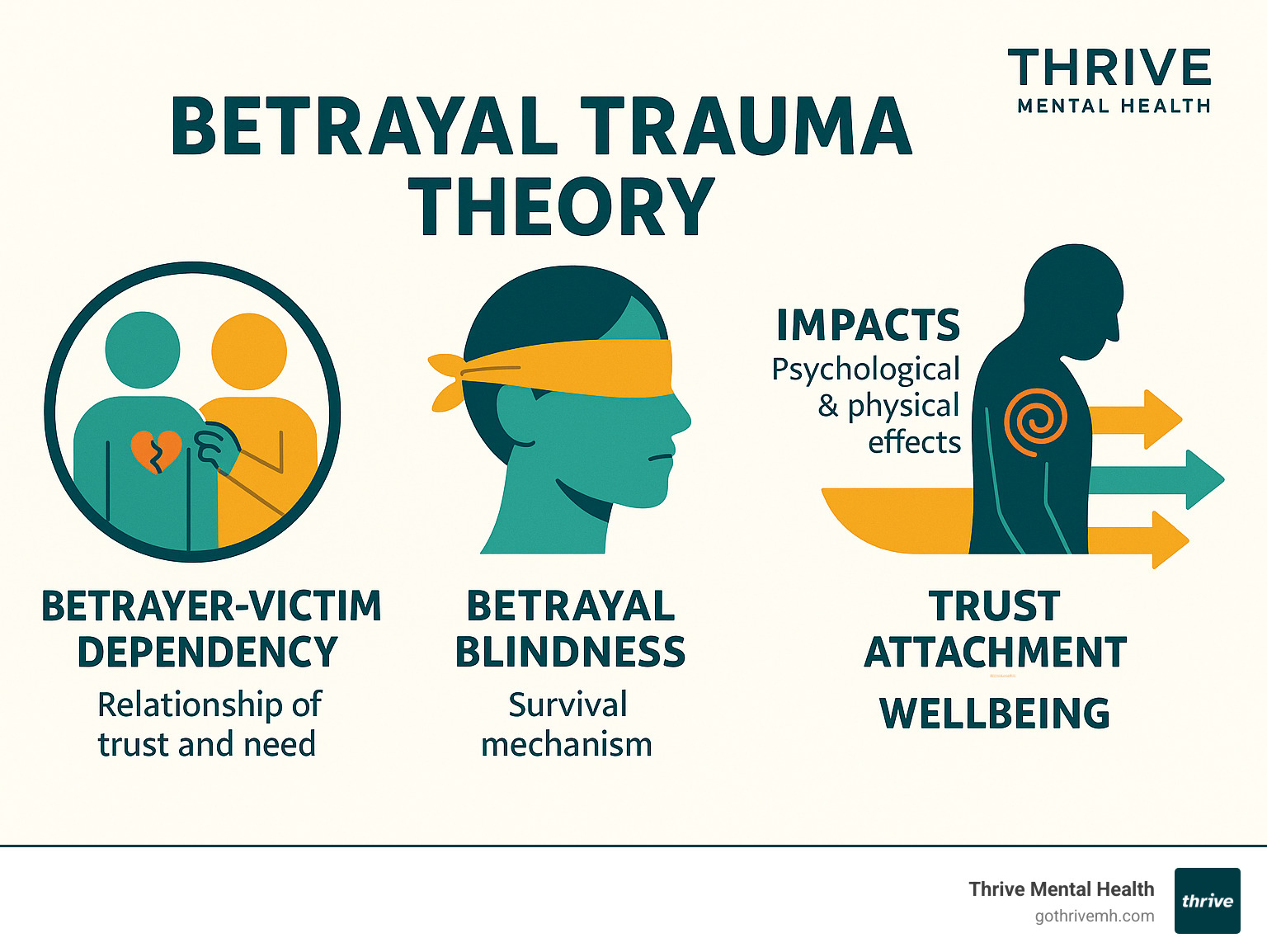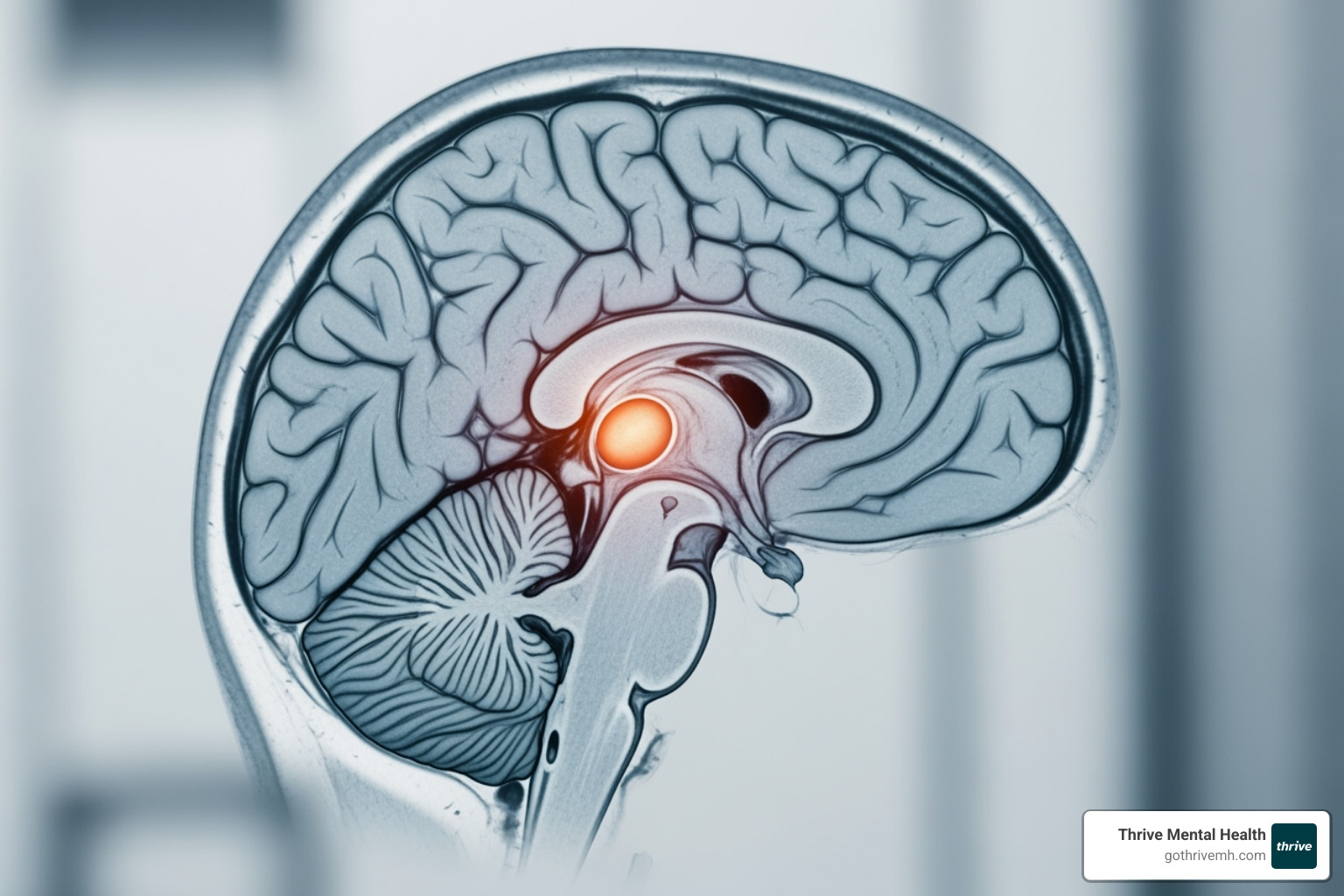Et Tu, Brute? Navigating the Pain of Betrayal Trauma

Why Betrayal Trauma Cuts Deeper Than Other Forms of Trauma
Betrayal trauma is a specific psychological wound that occurs when someone we depend on for safety and support violates our trust. Unlike other forms of trauma, it involves harm from the very people we rely on most, making it uniquely devastating and complex to heal from.
Key aspects of betrayal trauma:
- Who causes it: Parents, romantic partners, caregivers, or trusted institutions.
- Core mechanism: Creates a conflict between needing the person and being harmed by them.
- Survival response: Often involves “betrayal blindness”—unconsciously ignoring red flags.
- Impact: Affects the ability to trust, form relationships, and feel safe.
- Common symptoms: PTSD, anxiety, depression, dissociation, and relationship difficulties.
The concept was introduced by psychologist Jennifer Freyd in 1991. Her research revealed that when we’re betrayed by someone we depend on, our brain often suppresses awareness of the betrayal to preserve the vital relationship. This creates a psychological trap where we may minimize, forget, or rationalize harmful behavior.
Betrayal trauma is different because it’s a fundamental violation of trust within a dependent relationship. While a car accident is traumatic, betrayal by a loved one attacks our core beliefs about safety, love, and human connection, with effects that ripple through every aspect of life.
As Nate Raine, CEO of Thrive Mental Health, I’ve witnessed how betrayal trauma uniquely impacts individuals in our Florida programs. My experience has shown me that addressing these wounds requires specialized, trauma-informed approaches that honor both the complexity of the trauma and the resilience of the human spirit.

Understanding the Core of Betrayal Trauma

To understand betrayal trauma, we must explore what makes it so uniquely painful. Unlike trauma from strangers or disasters, betrayal wounds our foundation of trust and safety.
What is Betrayal Trauma and How is it Different?
Betrayal trauma is the deep psychological wound that occurs when someone we depend on for safety, love, or survival causes us harm. The key difference lies in dependency. A child needs a parent; a spouse may depend on their partner. When these vital relationships become sources of harm, our minds face a devastating conflict.
This creates a “double bind”: we need the very person who is hurting us. Our survival instincts tell us to flee, but our dependency keeps us trapped. This internal war makes betrayal trauma far more complex than other traumas. While being mugged is traumatic, being abused by a parent attacks our core beliefs about safety, love, and trust.
| Betrayal Trauma | Classic PTSD |
|---|---|
| Caused by trusted individuals or institutions | Often caused by strangers, accidents, or natural disasters |
| Creates dependency conflict | No relationship dependency involved |
| Often involves ongoing exposure | Usually single or time-limited events |
| Attacks core beliefs about trust and safety | Primarily affects sense of physical safety |
| May involve “betrayal blindness” | Memories typically remain accessible |
| Often includes shame and self-blame | Less likely to involve self-blame |
The Origins: Jennifer Freyd’s Groundbreaking Theory
In 1991, psychologist Jennifer Freyd introduced a new way to understand trauma. She observed that when people were hurt by those they depended on, their minds responded differently.
Freyd’s research revealed that betrayal trauma triggers unique survival mechanisms. For example, when a child is abused by a caregiver, their brain faces an impossible choice: acknowledge the abuse and risk losing the vital relationship, or find a way to cope while staying connected.
The mind’s solution is often dissociation—disconnecting from the traumatic experience. This isn’t weakness; it’s a brilliant survival strategy. By blocking out or minimizing the harm, the child can maintain the attachment bond they need. Freyd called this “knowledge isolation,” where the mind separates traumatic experiences from conscious awareness to preserve necessary relationships. This insight helps explain why people struggle to leave abusive situations—it’s a hardwired survival response.
The Psychology of ‘Betrayal Blindness’
Ever wonder why capable people miss obvious red flags in relationships? The answer is “betrayal blindness,” our mind’s unconscious ability to ignore signs of betrayal when we are dependent on the person harming us. Our brain essentially decides, “I can’t afford to see this right now because I need this person too much.”
Betrayal blindness works by rationalizing harmful behavior (“They’re just stressed”), minimizing the impact (“It wasn’t that bad”), or even self-blame (“I must have done something to deserve this”). This creates intense cognitive dissonance—the discomfort of holding conflicting beliefs (e.g., this person loves me, but they also hurt me). Rather than face this contradiction, our minds often suppress awareness of the betrayal.
We might normalize abuse, make excuses for others, or develop amnesia around traumatic events. Understanding betrayal blindness is crucial for healing because it reframes this lack of awareness not as a personal failing, but as a survival mechanism. This response often overlaps with other trauma responses like fawning behavior, where we try to please our abuser to maintain safety. Recognizing these patterns is the first step toward trusting our perceptions again.
The Causes and Types of Betrayal
This section explores the various contexts where betrayal trauma occurs, from childhood to institutional failures, highlighting how different violations leave distinct marks.
Childhood Betrayal: When Caregivers Cause Harm

Childhood betrayal trauma is often the most profound because children are completely dependent on caregivers. When these protectors become sources of harm, it creates a devastating psychological conflict.
Physical and sexual abuse by a caregiver are severe violations of trust, creating confusion about safety, love, and relationships. However, betrayal isn’t always physical. Emotional abuse, such as constant criticism or threats of abandonment, can be just as damaging. This includes emotional incest, where a parent burdens a child with adult problems, forcing them into a role they are not equipped for.
Parental neglect is another form of betrayal. When caregivers fail to meet a child’s basic emotional or physical needs, they break the fundamental promise of care. A child cannot simply leave an abusive parent, so they must find ways to survive within this contradictory relationship.
These early betrayals often lead to repeating harmful patterns in adult romantic relationships. We unconsciously seek what feels familiar, even if it’s unhealthy. Understanding these dynamics is crucial, whether you’re Healing from Abandonment Trauma Caused by a Narcissistic Parent or recognizing the Understanding the Dynamics of a Narcissistic Mother: Key Signs and Impacts.
Adult Betrayals: From Infidelity to Institutional Failure
Betrayal trauma continues into adulthood. We form relationships built on trust with partners, friends, and institutions, and when that trust is shattered, the wounds are severe.
Infidelity is a well-known form of adult betrayal, but it also includes financial dishonesty (secret debts, gambling) or hidden addictions that violate a relationship’s transparency. Finding a partner’s betrayal often triggers PTSD-like symptoms, turning one’s world upside down.
Beyond personal relationships, institutional betrayal occurs when organizations we depend on fail us or cause harm. This is a particularly painful form of betrayal trauma because it involves systems we are taught to trust.
- Military Sexual Trauma (MST): When service members are assaulted and the institution fails to provide justice, it compounds the original trauma.
- Academic Institutions: Schools can betray students by mishandling reports of sexual assault or harassment.
- Healthcare Systems: Betrayal can occur through malpractice or when institutions prioritize profits over patient care.
- Police Brutality: This is a devastating betrayal of the social contract, as law enforcement is meant to protect communities.
Research on institutional betrayal’s impact shows these failures create a “second assault.” The institution’s failure to respond appropriately deepens the psychological wounds, eroding trust in the very systems designed to keep us safe.
The Widespread Impact on Mind and Body
Betrayal trauma leaves deep wounds that affect psychological, physical, and relational well-being. Its impact ripples through every aspect of our lives, influencing how we think, feel, and interact with the world.
Psychological and Emotional Scars of Betrayal Trauma
The psychological toll of betrayal trauma is immense, attacking our sense of reality and self-worth. Many people develop Post-Traumatic Stress Disorder (PTSD) or Complex PTSD (C-PTSD), experiencing intrusive thoughts, flashbacks, and hypervigilance. Anxiety and depression are common, manifesting as panic attacks or a heavy sense of hopelessness.
Dissociation—feeling detached from yourself or reality—can become a coping mechanism that lingers long after the betrayal. Emotional dysregulation is also common, leading to intense mood swings that feel uncontrollable. Perhaps most painfully, shame and self-blame take root, with thoughts like, “I should have seen the signs.” This internalized shame erodes self-worth and can lead to unhealthy coping mechanisms like substance use or eating disorders. If you’re struggling, you can find insights in How PTSD Impacts Daily Life: The Role of Flashbacks, Avoidance, and Anxiety.
The Physical Toll: How the Body Keeps the Score

Your body keeps the score of betrayal trauma, holding onto the pain in physical ways. Trauma can alter brain function: the hippocampus (memory) may shrink, while the amygdala (threat detection) becomes hyperactive. This neurological chaos can trigger a cascade of physical symptoms.
Common physical manifestations include:
- Chronic pain in the back, shoulders, or joints.
- Gastrointestinal issues like IBS or nausea.
- Sleep disturbances, including insomnia or nightmares.
- Appetite changes, leading to weight loss or gain.
- Chronic fatigue, a bone-deep exhaustion that rest doesn’t cure.
As studies show, there is a clear link between high-betrayal traumas and various physical illnesses. Your nervous system can get stuck in a fight, flight, freeze, or fawn response, taking a tremendous toll on your overall health.
Shattered Connections: The Effect on Relationships
Perhaps the cruelest irony of betrayal trauma is how it damages our ability to connect with others when we need support most. When trust is shattered by someone close, it can color every future connection with suspicion and fear.
Trust becomes difficult, and you may find yourself analyzing every word and gesture for signs of deception. Attachment patterns can be disrupted, leading to a push-pull dynamic of desperately wanting closeness while simultaneously fearing it. Many people unconsciously repeat unhealthy relationship patterns because the dysfunction feels familiar.
Fear of intimacy and vulnerability can build walls around your heart, and social isolation often follows as relationships feel too overwhelming to manage. The constant mental turmoil makes it hard to be present with others, and self-doubt can poison interactions from within. If you trusted someone completely who betrayed you, how can you trust your own judgment? This fundamental shift can leave you feeling profoundly alone. If you’re struggling, you might find guidance in Navigating Relationships with Mental Illness.
Pathways to Healing and Recovery
While the path forward after betrayal trauma is challenging, healing is absolutely possible. Recovery isn’t about returning to who you were before—it’s about integrating your experience and building a stronger, more authentic self. This journey requires patience, self-compassion, and often professional guidance.
Essential Coping Strategies for Betrayal Trauma
Healing begins with one crucial step: acknowledging the trauma. Your feelings of anger, grief, and confusion are valid responses to a profound violation. Resist the urge to rationalize what happened.
- Journaling: Writing can help you process complex emotions and identify patterns in your thinking.
- Grounding Techniques: When overwhelmed, use the 5-4-3-2-1 technique (name 5 things you see, 4 you touch, etc.) to anchor yourself in the present.
- Self-Compassion: Treat yourself with the kindness you’d show a friend. The betrayal was not your fault.
- Setting Boundaries: Firm boundaries are essential for protecting your emotional well-being. This might mean limiting contact with the person who betrayed you or clearly stating your needs in all relationships.
- Seeking Support: Lean on trusted friends, family, or support groups who validate your experience.
Healing isn’t linear. For more guidance, explore Expert Tips on Coping with Trauma for Better Mental Health.
Professional Treatment for Betrayal Trauma
While self-help is valuable, professional support is often essential for navigating betrayal trauma. A qualified therapist provides a safe space and specialized tools to help you rebuild your life.
- Trauma-Informed Therapy: This approach prioritizes safety, trustworthiness, and empowerment, creating an environment where healing can happen.
- Eye Movement Desensitization and Reprocessing (EMDR): This therapy helps process traumatic memories using bilateral stimulation, reducing their emotional charge. Learn more at How EMDR Therapy Reduces PTSD Symptoms and Boosts Mental Health.
- Dialectical Behavior Therapy (DBT): DBT teaches concrete skills in mindfulness, distress tolerance, and emotion regulation to address the instability that follows betrayal.
- Somatic Experiencing (SE): This body-focused approach helps release trapped trauma from your nervous system, addressing physical symptoms.
For long-term trauma, therapies for Complex PTSD can be transformative. Find more about specialized support at Effective Complex PTSD Counselling Strategies and Support.
Finding Specialized Support in Florida
Finding the right professional is crucial. Look for therapists who specialize in trauma, PTSD, or C-PTSD and understand concepts like attachment theory and “betrayal blindness.”
At Thrive Mental Health, we understand the unique pain of betrayal. Our virtual and in-person intensive outpatient (IOP) and partial hospitalization (PHP) programs are designed for adults and young professionals in Florida who need more than traditional weekly therapy.
Our intensive programs offer a structured framework with multiple therapeutic modalities to process deep-seated trauma and build lasting coping skills. With flexible virtual options, you can access expert care from anywhere in Florida—whether you’re in Tampa Bay, St. Petersburg, or Central Florida.
Our evidence-based approach combines individual therapy, group support, and specialized trauma treatments custom to your needs. For those seeking help, we encourage you to explore our specialized approaches: Access Quality Abuse Therapy Near You. Taking the first step is an act of courage and a commitment to reclaiming your life.
Conclusion
The journey through understanding betrayal trauma reveals a painful truth: the deepest wounds often come from those we depend on most. When the people meant to keep us safe become sources of harm, it fundamentally changes how we see ourselves and the world.
We’ve explored why these experiences cut so deep, from Jennifer Freyd’s research to the psychology of betrayal blindness. Betrayal trauma is a unique violation that attacks our core beliefs about safety, love, and trust, affecting our minds, bodies, and ability to connect.
The ripple effects are profound, from a hypervigilant nervous system to a shattered sense of self. But here is what’s most important to remember: healing is not only possible—it’s happening every day.
Recovery isn’t about forgetting. It’s about acknowledging the pain, understanding its impact, and slowly rebuilding your sense of safety from the inside out. It’s about learning to trust your own perceptions again and finding that you can form healthy connections.
This journey looks different for everyone. Some find solace in self-help strategies, while others need the specialized support of trauma-informed therapy like EMDR or DBT, often within intensive programs that provide comprehensive care.
At Thrive Mental Health, we’ve witnessed countless individuals in Florida reclaim their lives after betrayal trauma. Our virtual and in-person programs are designed for adults and young professionals who need flexible, expert-led support. We understand that recovery is a journey of refinding your strength, worth, and capacity for connection.
You don’t have to face this alone. The path forward exists, and with the right support, you can walk it. Your story doesn’t end with betrayal—it begins again with healing.
Learn more about our specialized trauma treatment programs and take the first step toward reclaiming your peace, your power, and your ability to trust again.